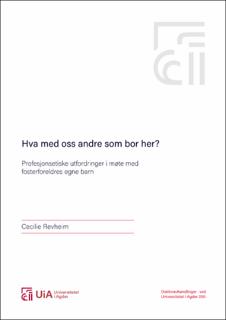| dc.contributor.author | Revheim, Cecilie | |
| dc.date.accessioned | 2022-11-17T12:27:42Z | |
| dc.date.available | 2022-11-17T12:27:42Z | |
| dc.date.created | 2020-01-13T09:18:28Z | |
| dc.date.issued | 2019 | |
| dc.identifier.citation | Revheim, C. (2019). Hva med oss andre som bor her? Profesjonsetiske utfordringer i møte med fosterforeldres egne barn [PhD. thesis]. University of Agder. | en_US |
| dc.identifier.isbn | 978-82-7117-950-2 | |
| dc.identifier.issn | 1504-9272 | |
| dc.identifier.uri | https://hdl.handle.net/11250/3032438 | |
| dc.description | Available as a book: https://doi.org/10.18261/9788215055916-2023 | |
| dc.description.abstract | My thesis is both an empirical and ethical study, which means that I do an ethical analysis of the empirical material. The empirical part of the study is a qualitative analysis of how challenges in foster care placement may impact on foster carers’ own children. This is followed by an ethical analysis of professional ethical challenges raised by the circumstances of foster carers’ children. To identify such challenges, knowledge about the foster sibling relationship, first and foremost through the life experiences of children of foster parents, is crucial.
In Norway, limited research attention is given to how the foster parents’ own children make meaning of their role and participation in foster care. International studies on experiences of biological children in foster care abroad, have found potential tensions and risk of loss and difficulties growing up with foster siblings and conclude that more research is needed. The lacuna of this research is professional discussions on how ethical dilemmas and challenges are embedded in foster care, and the moral responsibility of the social workers for the wellbeing of these children. In this way, the study can be said to focus on ethical issues in social work practice, more specifically on how professionals encounter ethical difficulties in their professional relationship with biological children in foster families.
The main issue in my research project is: what professional ethical challenges can foster care placement represent regarding foster carers’ own children as an affected third party?
The overall aim of the study is guided by four research questions:
1. How do children of foster carers reflect upon their own experiences with growing up with foster siblings?
2. How do foster parents reflect on how foster care placement impact on their own children?
3. How can my results in research question 1 and 2 bring up professional ethical challenges?
4. In what ways do guidelines, legislation and social politics governing Foster Care take foster carers’ own children into consideration? | en_US |
| dc.language.iso | nob | en_US |
| dc.publisher | University of Agder | en_US |
| dc.relation.ispartofseries | Doctoral Dissertations at the University of Agder; no. 250 | |
| dc.rights | Attribution-NonCommercial-NoDerivatives 4.0 Internasjonal | * |
| dc.rights.uri | http://creativecommons.org/licenses/by-nc-nd/4.0/deed.no | * |
| dc.title | Hva med oss andre som bor her? Profesjonsetiske utfordringer i møte med fosterforeldres egne barn | en_US |
| dc.type | Doctoral thesis | en_US |
| dc.description.version | publishedVersion | en_US |
| dc.rights.holder | © 2019 Cecilie Revheim | en_US |
| dc.subject.nsi | VDP::Samfunnsvitenskap: 200 | en_US |
| dc.source.pagenumber | 418 | en_US |
| dc.source.issue | 250 | en_US |
| dc.identifier.cristin | 1771036 | |

